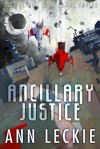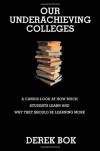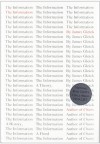Currently reading
McGlue
Knife Fight and Other Struggles
Far from the Tree: Parents, Children, and the Search for Identity
The Good Lord Bird
Ancillary Justice
Our Underachieving Colleges: A Candid Look at How Much Students Learn and Why They Should Be Learning More (New Edition)
Dissident Gardens
Nightmare Movies: Horror on Screen Since the 1960s
The Information: A History, a Theory, a Flood
Complete Novels
 This is a hard book to review, as the quite positive but bland affirmation by Mark Costello indicates. Short version: I was utterly engrossed. I recommend it highly. But I worry that anything I could say about it would turn you off. E.g.,
This is a hard book to review, as the quite positive but bland affirmation by Mark Costello indicates. Short version: I was utterly engrossed. I recommend it highly. But I worry that anything I could say about it would turn you off. E.g., a) any summary will give it a sense of high-concept plot (cop on the beat in suburban Colma, a city of cemeteries, communes with the dead) that would either lure in narrative junkies bound to be disappointed by a far more meandering character study (I was reminded most often of Richard Russo's understated skill) OR scare off readers (like me, when first hearing of it), fearful that this is a glorified movie pitch. OR
b) any expanded riff on its governing metaphor (the dead alive, the living not really living) might turn its matter-of-fact agility into left-footed stomping.
And if (a) or (b) weren't enough, if I hinted that it's about people stuffed with small regrets who find, by novel's end, a sense of meaning ... you'd probably turn tail and run, eh?
I admit that I backed into reading it, myself. I first heard about this from a post on forthcoming books at Locus, the sci-fi magazine. The title veered toward very silly or wonderfully confident, so I jumped to see the cover image and find out anything else at Amazon, and it had a cartoon on the front. A good one, but, still (I thought): and comic-booky premise. Never mind.
Then flash-forward to a couple weeks ago, the book's on the shelves, I grab it to take a look and its back-cover blurbs are from a very intriguing band, notably Thom Jones, Dan Chaon, Kevin Brockmeier. (I look at blurbs, but it's less a matter of finding my favorite authors logrolling one another than finding a strange coalition of favorites. I recall grabbing my first Stephen Wright novel cold, in hardcover, without any prior knowledge, just because Robert Coover, Don DeLillo, and Toni Morrison all pimped it. So blurbs don't matter, except when they do.) This got me to give it a closer look.
The book is very Fred Astaire, so light on its feet that 400 pages flash by. There's any number of wonderful moments, pitch-black cop conversations that made me laugh out loud, some lovely precise images of the NoCal coast. But I went looking for dazzle to illustrate my point and came a cropper. The book isn't showy; each line is a little pebble, not much to ponder on its own, small and hard and clear, but taken en masse Dorst slowly builds a rock garden, ordered and beautiful, and it catches the eye.
All I'm doing here is trying to circle around the fact that this is a book I think was really damn good, but I'm not sure how to convince you that it's really damn good, and every move I make in that direction I fear might have the opposite effect, so: wanna go out on a limb and trust me?












